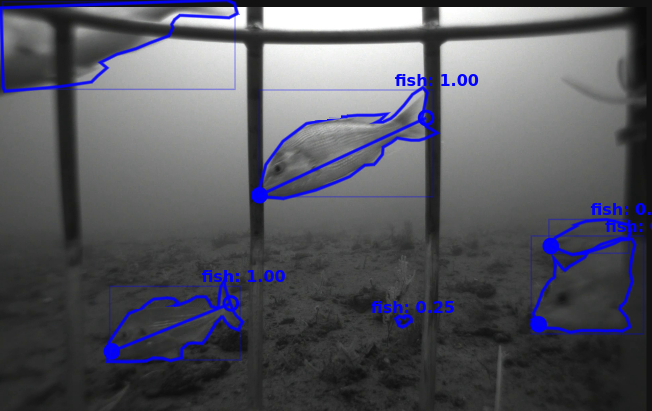OCEAN SCIENCES MEETING (OSM)
Hosted by the American Geophysical Union, the Association for the Sciences of Limnology and Oceanography, and The Oceanography Society
February 24, 2022 – March 4, 2022, Virtual
OSM is the global leader in ocean sciences conferences. The event serves as an opportunity for the ocean sciences community to discuss both basic and applied research while making scientific and social connections. This year, OSM will focus on the importance of working together and collaborating within the ocean science community to move toward a sustainable future. [You can register to attend OSM here]
Kitware has previously been involved at OSM 2018 and 2020, and with the ocean sciences community at large, due to our impactful contributions through our open source technology. For example, our open source platform VIAME helps us leverage both state-of-the-art artificial intelligence and computer vision to monitor the health of our ocean’s ecosystems. Our open source ADAPT Multi-Mission Payload lets users deploy real-time computer vision from a small drone. Participating in OSM is a great opportunity for our team to meet with government and industry researchers, academics, and students to discuss how we can collaborate on important ocean science initiatives. If you would like to schedule time with us during the conference or set up a meeting for a later date, please email us at computervision@kitware.com.
Kitware’s Activities and Involvement
Kitware is excited to have three oral presentations accepted at OSM this year, which are listed below along with the dates/times and descriptions. Anthony Hoogs, Ph.D., vice president of artificial intelligence at Kitware, is also one of the organizers for the session “Realizing the Promise of Marine AI: Moving from Research to Operations.” This session brings together leaders in the marine, environmental, and computer science communities to connect current challenges with novel, intuitive, and actionable operational solutions. The speakers will address the full lifecycle of AI operationalization and MLops concepts, as well as the organizational and cultural shifts that are needed to operationalize AI development, create trustworthy AI, and up-scale AI solutions from research to full operational usage. The session will take place on Tuesday, March 1 from 6-7 PM and will include two presentations from Kitware.
Tuesday, March 1 from 6-7 PM | Realizing the Promise of Marine AI
Presenter: Matt Dawkins, Staff R&D Engineer at Kitware
This presentation will review the latest advancements made to VIAME, an open source video and image analysis toolkit initially developed for marine environments by Kitware. VIAME helps alleviate the burden of having to analyze your visual data manually. The toolkit includes a wide range of analysis capabilities such as object detection, object tracking, rapid model generation, and image classification. VIAME also provides intuitive user interfaces which allow scientists to create new analytics specific to their problems without any programming or knowledge of deep learning. Recently, significant functionality has been added to VIAME, including cloud integration, user interface updates, object segmentation, stereo measurement, preliminary satellite imagery handling, AI-assisted annotation support, and improved detectors. VIAME was developed under NOAA funding and is freely available with permissive licensing. It’s currently in use at all six of the NOAA Fisheries Science Centers, as well as other laboratories around the world. It has been applied to problems ranging from scallop detection to fish and plankton classification, as well as seal detection and image registration.

Tuesday, March 1 from 6-7 PM | Realizing the Promise of Marine AI
Presenter: Brian Hu, Ph.D., Senior R&D Engineer at Kitware
This presentation will provide an overview of explainable artificial intelligence (XAI) and how it helps end users understand and appropriately trust machine learning systems. Brian will highlight common problems and techniques, such as saliency maps, and share how Kitware has practically applied this technology to their work on explainable image classification and retrieval. He will also introduce the XAI ToolKit (XAITK), an open source development effort led by Kitware to collect data, software, and papers from the four-year DARPA XAI program into a common data and software framework. XAITK will be of broad interest to anyone who deploys AI capabilities in operational settings and needs to validate, characterize and trust AI performance across a wide range of real-world conditions and application areas. XAITK will contain many XAI capabilities and as well as datasets, papers and reports that will provide scientific and technical guidance for understanding and deploying AI technology.
ADAPT: Drone Payload for Data Collection and Real-Time AI Processing in the Field
Wednesday, March 2 from 3:30 PM – 4:30 PM | Real-time automated decision making for ecosystem study and management
Presenter: Matt Brown, Ph.D., Principal Engineer at Kitware
This presentation will address the current limitations faced by the environmental science community when you have to post-process data after a collection event has been completed.
As a solution to this problem, Matt will introduce ADAPT, a multi-purpose data collection and real-time processing payload for small unmanned aerial vehicles. ADAPT allows researchers to deploy real-time AI algorithms in the field so they can investigate the content and quality of their data during or shortly after collection. This capability maximizes data utility, facilitates archive curation, and rapidly disseminates results. ADAPT was developed under NOAA SBIR funding and all products of the ADAPT project will be distributed under a permissive open source license with the goal of sparking a large community of users.
Online Event
